.jpeg?width=300&name=hotel%20digital%20marketing%20strategy%20header%20(1).jpeg)
Hotel Digital Marketing Strategy That Works
Last updated: October 3, 2025
Raise one hand if you can't stop fantasizing about direct bookings, swelled accommodations, and a pitch-perfect hotel brand. Now, raise your other hand if your hotel digital marketing strategy is perfectly in place and in full swing! (Can't see you, but we're guessing not many of you have both hands up.)
Direct bookings and ballooned accommodations can't come to fruition if there isn't a solid hotel digital marketing strategy in place. In other words, any hotel owner that dreams of having a chock-full sales pipeline needs to be visible on the internet—whether that be Facebook, Instagram, or any other social platform.
You probably have a ton of questions, but perhaps the biggest of them all is this: Do I really need to be very active online when I am getting a good flow of customers off traditional marketing tactics? The answer is a resounding yes! Buying power is changing at a pace never seen before.
 As we speak, millennials have already taken over the market, accounting for over two-thirds of the world's buying power. They also spend much time on social media, with the average millennial spending no less than 2 hours 30 minutes on these platforms. Let's be honest—there's never been a better time to ramp up your hotel sales and reputation.
As we speak, millennials have already taken over the market, accounting for over two-thirds of the world's buying power. They also spend much time on social media, with the average millennial spending no less than 2 hours 30 minutes on these platforms. Let's be honest—there's never been a better time to ramp up your hotel sales and reputation.
In this blog, we're going to cut through the noise and serve you the secret sauce of hotel digital marketing. No-fuss. No empty promises. Just a slew of great points to give your hospitality marketing strategy a true and lasting lift. Ready? Let's dive right in.
The Best Online Hotel Marketing Strategies
Two words can best describe today's hotel industry: dynamic and competitive. From the rise of smart hotels to a widespread preference for personalized client experiences, the evolutions of the past decade have thrust marketing efforts firmly into the spotlight.
Considering nearly 60% of the world's population are active internet users, effective digital marketing strategies are no longer an afterthought but rather a no-brainer. Whether you are looking to increase bookings, launch a brand new hotel, or bolster your brand, digital has become the name of the game, and inevitably so. It's quite frankly, shape up or shape out time.
That said, here are the six best digital hotel marketing strategies for the savvy hotelier:
1. Google Business Profile
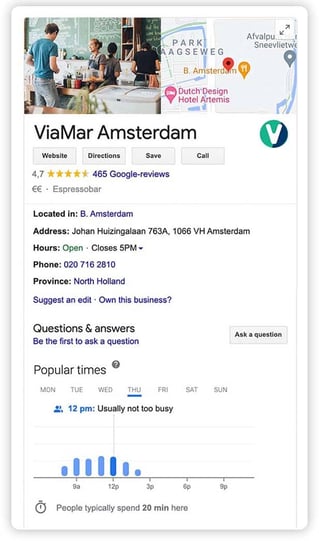
Search engines play a vital role in the success of hotel businesses. And when it comes to search engines, Google is undoubtedly the king. Along with the mighty search engine, the search giant also offers a lineup of robust features that help you rank highly on the net. One such feature is a Google Business Profile).
Think of your Google Business Profile as the E-card for your business. It harbors any and all information related to your property—ratings, star categories, location, contact details, facilities, prince range, FAQs, photos, and everything in between. Before making a booking, a prospective guest first hits the internet to look up the details of the property they'd be interested in. Guess where they find this info? That's right—your Google Business listing.
It is said that approximately 53% of consumers visit a business within 48 hours of performing a local search on Google. Here's what this statistic means: almost half of the population searching for your hotel online can be converted into customers. A well-elaborated Google Business Profile makes reaching out easier, allowing customers to get quick info about your property and make a booking decision just as quickly.
To lock in your Google Profile, follow these five simple steps:
- Sign in to your Google Business Profile using your business email domain
- Enter your business name
- Enter your location (including your address and/or service area)
- Fill in your contact information (including your business phone number and website address)
- Finish and manage your listing
You're not out of the woods just yet. To have a working Google Business Profile, you'll have to verify it using one of these methods: Postcard by Mail, phone, or email. Choose the option that suits you best.
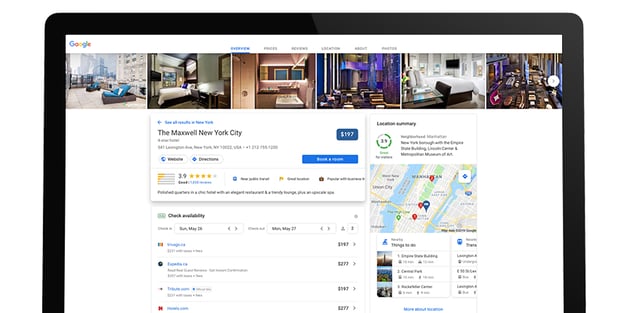
When it comes to powerful features, GMB seriously outdoes itself. Here's what you can get from such a listing:
- Hotel features and attributes
- Auto-update user-generated content geotagged with your brand
- Ratings and reviews
- Integrated meta-search to facilitate seamless bookings
Remember, no matter how sparkly your business is, it's never really going to take off if it's not visible online. So before everything else, be sure to have your own website, complete with all the bells and whistles a hotel website should have.
2. Optimize Your Website
Speaking of websites, your hotel digital marketing strategy is as good as dead if there isn't a vehicle to power it forward. That vehicle is your website.
When we say a website, we don't mean you put up a few pictures, your mission statement, and be done with it. No, not at all. We mean a hotel website that captures the visitors' eyes in a split second, tugs at their heartstrings and compels them to book a room in your hotel. How does one pull that off, you ask? One word: optimization.
There are many ways to optimize your website for hotel marketing. Here are five tips:
- Use high-resolution photos: The mantra don't judge a book by its cover doesn't apply in the hospitality industry. Travelers want to see what they're getting themselves into. Make sure to use high-resolution photos of your hotel on your website. Don't overdo it, though. Edited photos are a real morale killer.
- Tell a story, and tell it well: No one likes a website that's filled with purely salesly language. Tell a story that travelers can quickly and deeply relate to and would compel them to book with you. Don't just say you're located on the flanks of a great river. Say that you offer a home away from home from which a new adventure awaits your guests at every turn.
- Add Google Maps 360: Google is literally the gift that keeps on giving. Part of its over-evolving package is Google Maps 360, a tool that allows guests to virtually roam your hotel. It's engaging, interactive, and can definitely provide an immersive experience for your guests.
.png?width=750&name=Google%20360%20tour%20hotels%20(1).png)
- Create a blog: They might have told you that content is king, but they didn't mention that the blog is its vehicle. If you haven't already, add a blog to your website. Sprinkle in interesting topics, probably about must-visit places in your area, restaurants they have to try, or helpful travel tips. These types of topics make up what is called "value in advance." In other words, you're giving your customers something valuable even before they book.
- Make your site mobile-friendly: Most last-minute bookings are made on phone, not desktops. So if your website isn't mobile-friendly and responsive, you're in for a huge disappointment. Making images as light as possible, spacing out your links, removing excess content, and using a larger and readable font are all ways to deliver a great browsing experience—regardless of screen size.
3. Social Media
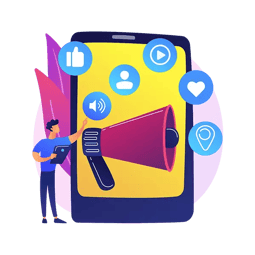
When it comes to marketing your hotel brand on social media, it's the quality that matters, not quantity. It's better to be well represented on one platform than to be weakly represented in all of them.
That said, social media is an incredibly versatile hotel digital marketing tool because it engages both existing and potential customers. The lines of communication on this platform are short, the threshold is low, and you can respond to messages on the fly.
Wondering how you can utilize social media to increase brand presence and sales? Here are a few foolproof tips:
- Share your brand's voice consistently—after all, you only want to engage with like-minded travelers
- Create shareable or viral content
- Offer irresistible deals
- Create a human connection that visitors will appreciate
- Be consistent on all your social media profiles
To maximize your results, consider hiring a digital marketing agency that specializes in the hotel industry. Beyond doing the heavy lifting on your behalf, they can also give you handy marketing tips, some of which can prove valuable down the road.
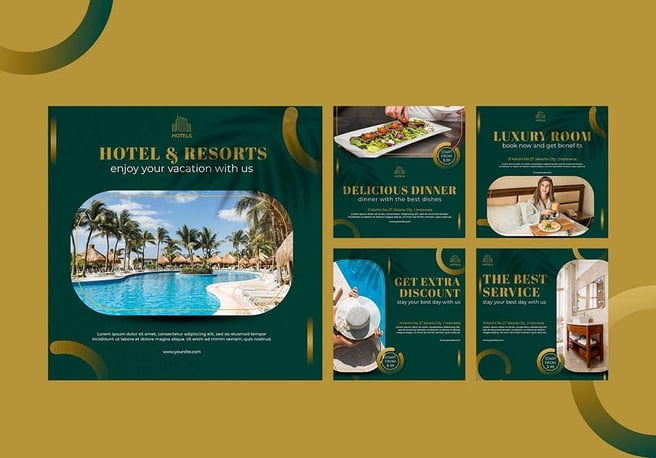
4. Email Marketing
With hotel owners still reeling from the pangs of the pandemic, email marketing has quickly emerged as a smart, budget-friendly way to engage with potential customers. Mind you, 94% of internet users use email. So if you don't make an effort to polish up this aspect of your digital hotel marketing strategy, you'll end up chasing shadows and zero figures.
To help you elevate your email marketing game, we've crafted these quick-fire tips:
- Create responsive emails: A whopping 50% of all emails get opened on mobile. Thus, it is imperative to ensure that your potential customers' emails are fully optimized for mobile devices.
- Write a mind-blowing copy: Smart emails with minimalist design are one the most popular trends in hotel marketing right now. Ensure your subject line is remarkably written and conspicuous. That's the best way to incite viewers' attention and get them thinking hard about that hotel in the Maldives or that trip to Miami beach.
- Share wow-worthy images: A picture is definitely worth a thousand words. When sending an email, be sure to include stunning photos of your rooms, amenities, and landscapes to make it more memorable.
- Send regular email digests: By regularly sending email newsletters of the events that happened at your hotel, you can create and maintain stronger customer rapport in the long run.
5. Video
The use of video in marketing has dramatically skyrocketed in recent years. As many as 90% of customers want to see more video content from brands— hotels included—and the trend shows no signs of slowing down. Potential customers can get a good grasp of what to expect and experience through the combination of visual and audio elements.
Here are some ideas to strengthen your hotel marketing strategy through video:
- Offer virtual tours: Virtual tours enable your prospects to see your property, its amenities, and how versatile it can be—all without having to step foot inside of it.
- Introduce your team: If you have a world-renowned chef, do a spotlight on them. Has any of your concierges been working at the hotel for 20 years? Share their story. Highlighting your team not only boosts morale but also enables guests to know that, when they come to your hotel, they'll be working with the crème del a crème.
- Provide travel tips: Let's face it—your expertise in the hospitality industry is priceless, and there's no better way to highlight it than via video.
- Don't be afraid to pull at people's emotions: If the goal of your hotel digital marketing is to stand out and grab people's attention, one of the best ways to do that is to evoke people's emotion through video. In fact, according to a 2016 study from the Tempkin group, individuals that have a positive emotional connection with a brand are 8.4 times to trust the company and 7.1 more times to purchase.
6. Influencer Marketing
Influencer marketer is—dare we say?—the biggest marketing asset a hotel can have. Influencers are usually non-celebrities who are looked at by their followers as brand ambassadors and people who share authentic experiences. Get one on your side, and you stand a chance to reach thousands, sometimes millions of people outside your normal target market that might be interested in visiting your property.
Even statistics assert the real rage of this marketing strategy. A 2017 study by gen.video showed that upwards of 90% of social media users are persuaded to make a purchase after seeing social media content, with 33% of these users stating that influencers are trusted sources when making purchasing decisions.

Companies have recently shifted away from working with macro-influencers in favor of micro-influencers. Micro-influencers have high engagement rates, meaning that their followers actually take the time to like, comment on, or share their posts. The more engaged an influencer's audience is, the better.
That said, don't go around hiring influencers on a whim. Start by evaluating your budget and then stick to it. Once you've narrowed down your budget, decide what you want to achieve. What KPIs are you going for? This way, you can be sure to track your success.
7. Metasearch Hotel Engines
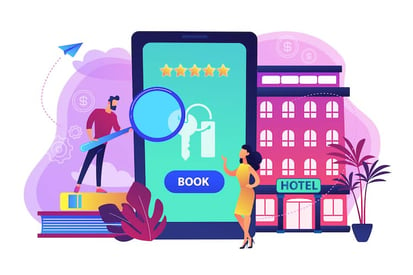 Metasearch hotel engines are a great way to get in front of people who are already looking for a place to stay. These engines allow potential guests to compare rates and availability from different hotels all in one place. Metasearch engines aggregate listings from online travel agencies (OTAs), such as Booking.com and Expedia. There are some metasearch hotel engines that let you create a profile for your hotel that you can manage and even utilize for paid advertisements.
Metasearch hotel engines are a great way to get in front of people who are already looking for a place to stay. These engines allow potential guests to compare rates and availability from different hotels all in one place. Metasearch engines aggregate listings from online travel agencies (OTAs), such as Booking.com and Expedia. There are some metasearch hotel engines that let you create a profile for your hotel that you can manage and even utilize for paid advertisements.
Don't Neglect Reputation Management
Technically, this is not a hospitality marketing strategy, but it's one that can shape the fortunes of your hotel sales now and into the future. How you ask? Well, without a good, solid reputation, potential visitors won't "trust" your property. Simple as that. According to TripAdvisor:
- 93% of the people use online reviews when determining which hotel they want to stay at
- 53% of people surveyed wouldn't book a hotel that didn't have online reviews
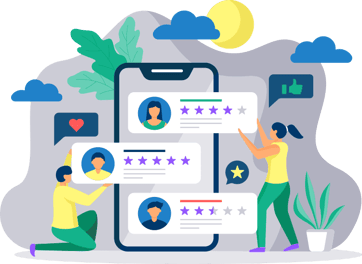 Now more than ever, it's vital that you as a hotelier get to grips with hotel reputation management and track your online reputation. For starters, use what you learn from your social networks to make improvements to the hotel experience. Be sure to respond to all reviews, both good and bad, so that users can get a sense that your hotel truly cares about what followers have to say. More importantly, if you get an awesome review on TripAdvisor, share it with your followers—because no content lures in prospects faster than positive reviews.
Now more than ever, it's vital that you as a hotelier get to grips with hotel reputation management and track your online reputation. For starters, use what you learn from your social networks to make improvements to the hotel experience. Be sure to respond to all reviews, both good and bad, so that users can get a sense that your hotel truly cares about what followers have to say. More importantly, if you get an awesome review on TripAdvisor, share it with your followers—because no content lures in prospects faster than positive reviews.
Hotel Marketing Software
You know the top digital marketing strategies needed to stay profitable in today's ever-changing hospitality realm. You understand the importance of reputation management. What next? You guessed it—finding the right hotel marketing software. Think of it as the final piece of your digital hotel marketing puzzle.
Let's look at them in a bit more detail:
- Branded templates: Whether you're marketing a single boutique hotel or a vast network of global resorts, reaching one goal can support all others—achieving brand compliance and consistency. Branded templates can help you nail down on that, effortlessly so. More specifically, they allow you to quickly create on-brand materials like ads, videos, social imagery, and POS for all your marketing channels.
- Digital asset management (DAM) software: A DAM allows hoteliers to manage their marketing processes by providing a central online hub for creating, managing, sharing, and finding digital assets. You can centrally store all your digital files (images, videos, etc.), making them easy to find and use when needed. It's akin to having all of your marketing assets at the tip of your fingers.
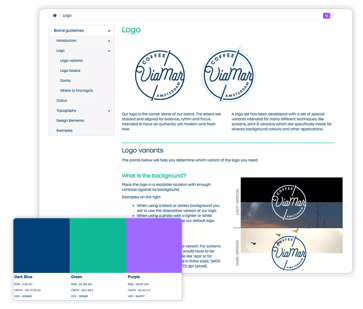 Digital brand guidelines: As we mentioned earlier, customers are likely to trust a more cohesive brand than one that offers an inconsistent brand experience. There's no better way to protect and augment your brand than through digital brand guidelines.
Digital brand guidelines: As we mentioned earlier, customers are likely to trust a more cohesive brand than one that offers an inconsistent brand experience. There's no better way to protect and augment your brand than through digital brand guidelines.- Social media management: Showing up consistently on social media is a must for hotels wanting to build and maintain strong customer relationships. Social media management software allows you to deliver on that goal by scheduling content and even planning/running ad campaigns.
- Google Analytics: One tool in your marketing toolbox is your own website. To figure out how well this marketing tool is performing for you and your property, consider leveraging Google Analytics. This free tool from Google helps you figure out all the touchpoints your prospects interact with throughout their customer journey. Google Analytics is an especially powerful tool when it comes to direct bookings—it tells you how visitors found your site, how long they stayed there, and even where they're located geographically.
- Campaign distribution tools: Managing your upcoming marketing campaigns and workload is an important aspect of running any business. Campaign distribution tools allow you to spread your campaigns quickly and easily across channels so that you have more time to do what you do best: bring in more visitors!
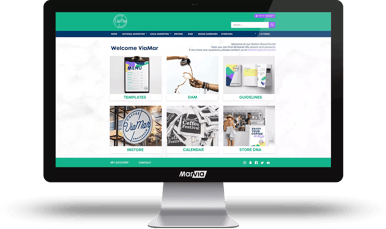 Marvia was made with hoteliers like you in mind. Our platform is as versatile as it is effective, boasting a range of salient features to help catapult your digital hotel marketing strategy to the next level. From powerful branded templates to sleek campaign distribution functionalities, we've got what you need to outwit and outpace your competitors.
Marvia was made with hoteliers like you in mind. Our platform is as versatile as it is effective, boasting a range of salient features to help catapult your digital hotel marketing strategy to the next level. From powerful branded templates to sleek campaign distribution functionalities, we've got what you need to outwit and outpace your competitors.
Looking to elevate your hotel's digital marketing? Schedule a demo with Marvia, and let's understand how to leverage Distributed Marketing.
